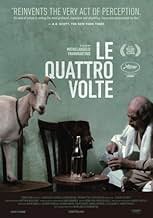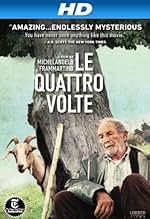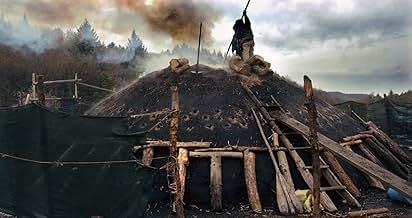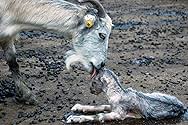Le quattro volte
- 2010
- Tous publics
- 1h 28m
An old shepherd lives his last days in a quiet medieval village perched high on the hills of Calabria, at the southernmost tip of Italy. He herds goats under skies that most villagers have d... Read allAn old shepherd lives his last days in a quiet medieval village perched high on the hills of Calabria, at the southernmost tip of Italy. He herds goats under skies that most villagers have deserted long ago. He is sick, and believes to find his medicine in the dust he collects on... Read allAn old shepherd lives his last days in a quiet medieval village perched high on the hills of Calabria, at the southernmost tip of Italy. He herds goats under skies that most villagers have deserted long ago. He is sick, and believes to find his medicine in the dust he collects on the church floor, which he drinks in his water every day.
- Director
- Writer
- Stars
- Awards
- 14 wins & 14 nominations total
- Director
- Writer
- All cast & crew
- Production, box office & more at IMDbPro
Featured reviews
This extensive use of long lasting shots and static moments at some point stop creating reflection moments and instead create reasons for the audience to grow bored which, to some extent, takes the effectiveness off the ending. Slow paced movies have to work in a particular way so that the audience may remain focused on the plot, to do this, things have to happen within the story presented; that rarely happens here.
So as other reviews mentioned, if the viewer has the desire to have a closer look at the rural Italian life, yeah, they'll find a sort of... well, slow view of what that is. If you're looking for an art-house kind of thing, this doesn't really work either. The real problem is that it doesn't either show enough rural life in terms of a documentary, nor is it deep enough to be a successful fiction film. Cute, but really wasn't able to engage the story.
There was not one word of dialog in the film. The only utterances was the dog barking and the sheep bleating.
An old man dies and presumably is reborn as a goat. The goat dies and it subsumed into a tree. The tree becomes charcoal, a mineral and dust.
Dust thou art and to dust thy shall return.
Matter is neither created nor destroyed.
Pick your interpretation.
It was a film to contemplate. It was full of Christian imagery, but it also stimulates mediation.
Not for everybody, but it was a beautiful film.
The doctrine that all things are part of the divine whether a tree, a lump of charcoal, an animal, or a human being is also dramatized in Le Quattro Volte, written and directed by Michelangelo Frammartino. Set in a small village in Calabria in Southern Italy where Pythagoras is said to have lived, Le Quattro Volte is a quietly meditative film that is divided into four sections separated by a blank screen. There is no narration or dialogue other than the dialogue of nature: the bleating of goats, the sheep bells, and the rush of wind blowing through the trees. Frammartino offers no clues or connections to the viewer as to what each segment represents. It is a film, he warns, in which "the viewer must do all the work." As the film opens, an old man (Giuseppe Fuda), emerges out of the smoke rising from a charcoal kiln, tending to his goats in a pastoral setting that may not have changed for hundreds of years. The goat herder has a persistent cough that he tends to by exchanging goat's milk for dust on the floor of the local church and mixing it with a glass of water. When he realizes that his medicine has disappeared, he goes back to the church late at night but it is closed. Without his elixir, he dies the following morning in his bed surrounded by a herd of goats that made their way into his bedroom, one standing on the top of his table.
Taking a page from Sergei Dvortsevoy's Tulpan, the scene shifts suddenly from the darkness of the old man's tomb to the birth of a live goat with its fluid being licked by its mother, a sequence that suggests the continuation of life. We follow the young kid as it grows steadily from taking its first steps to playing with other young goats. His development is interrupted, however, by a ten-minute sequence showing revelers taking part in a passion play celebrating Good Friday. Hilariously the old man's dog, after being chased off by villagers after annoying them with constant barking, retaliates by unblocking the wheels of their truck parked on a hillside causing it to roll down the hill, freeing a herd of goats enclosed in a pen.
As the goats are led through the forest, the baby goat becomes separated from the herd and wanders in the heavy brush until he lies down at the foot of a tall pine tree. With that, the film moves into another stage that shows the process of cutting down and stripping the tall tree. To complete the cycle, the tree is then made into a hut where wood and straw are converted into charcoal to provide heat for the winter, suggesting the oft-repeated phrase from The Book of Common Prayer, "ashes to ashes, dust to dust." Lacking in what is generally considered to be drama or character identification,Le Quattro Volte can be slow going and abstract, a film that rarely engages the emotions, yet it has a serene and contemplative beauty that allows its message of the impermanence of life to become manifest. As Eric Benet put it in his well-known song Dust in the Wind, "Don't hang on. Nothing lasts forever, but the earth and sky, it's there always and all your money won't another minute buy. Dust. . . all we are is dust in the wind. Dust in the wind Time for the healing to begin."
The title refers to the four seasons and the story follows a cycle of birth, death and rebirth. There is a symmetry in the film, and each part focuses on the fate of one individual (a farmer, a goat and a tree, for instance).
The film makes effective use of the beautiful landscape of Calabria, and the old, ramshackle village. The setting is perhaps in itself the main character of the film. Humans are often viewed from above, and we are in a sense getting the "God" treatment.
There is barely any plot or a story to speak of, yet we go through stages of life that are eternal and inevitable - and we are reminded again and again that all things must pass.
There are life-like documentary aspects to this feature. The film is shot in available light with amateur actors and animals that will endear you. The result is breathtaking and inspiring. The sound scape is also rich: it helps create an emotional journey through every chapter of the film.
I can highly recommend this to anyone interested in unusual films with no dialogue or discernible plot, but anyone also will no doubt be captivated by it's gorgeous setting, it's humble characters or the feeling of watching life pass, unfiltered.
Did you know
- TriviaThe film is comprised of long takes. One of them lasts an astounding 8 minutes.
- Crazy creditsThe end credits also include a silver fir, the goats of Caulonia and the coal of Calabria among the cast members.
- ConnectionsFeatured in Ebert Presents: At the Movies: Episode #1.15 (2011)
- How long is Le Quattro Volte?Powered by Alexa
Details
- Release date
- Countries of origin
- Official site
- Language
- Also known as
- Le Quattro Volte
- Filming locations
- Production companies
- See more company credits at IMDbPro
Box office
- Gross US & Canada
- $152,530
- Opening weekend US & Canada
- $16,192
- Apr 3, 2011
- Gross worldwide
- $717,918
- Runtime
- 1h 28m(88 min)
- Color
- Sound mix
- Aspect ratio
- 1.85 : 1






















